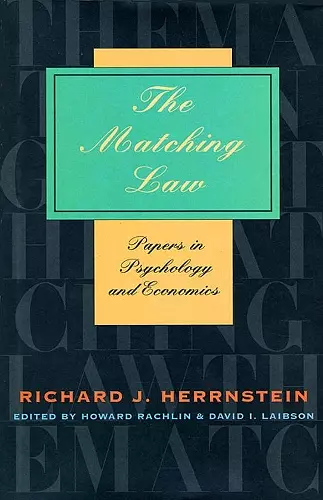The Matching Law
Papers in Psychology and Economics
Richard J Herrnstein author Howard Rachlin editor David I Laibson editor
Format:Paperback
Publisher:Harvard University Press
Currently unavailable, and unfortunately no date known when it will be back

The Matching Law tells us one big thing: people systematically misallocate their resources. Like pigeons, humans tend to focus on immediate rewards, and to neglect how current activities affect future payoffs...Choose this book. It will change your perceptions of the world, and subsequently, quite possibly how you spend your time. -- Richard J. Zeckhauser, Harvard University This collection of brilliant essays and lucid editorial introductions explains the fundamental law of action and choice that Herrnstein discovered, and highlights his unique contribution to our understanding of the persistence of self-destructive behavior. -- Daniel Kahneman, Princeton University
This collection consists of Richard Herrnstein's most important and original contributions to the social and behavioral sciences--his papers on choice behavior in animals and humans and on his discovery and elucidation of a general principle of choice called the matching law.
This impressive collection features Richard Herrnstein's most important and original contributions to the social and behavioral sciences--his papers on choice behavior in animals and humans and on his discovery and elucidation of a general principle of choice called the matching law.
In recent years, the most popular theory of choice behavior has been rational choice theory. Developed and elaborated by economists over the past hundred years, it claims that individuals make choices in such a way as to maximize their well-being or utility under whatever constraints they face; that is, people make the best of their situations. Rational choice theory holds undisputed sway in economics, and has become an important explanatory framework in political science, sociology, and psychology. Nevertheless, its empirical support is thin.
The matching law is perhaps the most important competing explanatory account of choice behavior. It views choice not as a single event or an internal process of the organism but as a rate of observable events over time. It states that instead of maximizing utility, the organism allocates its behavior over various activities in exact proportion to the value derived from each activity. It differs subtly but significantly from rational choice theory in its predictions of how people exert self-control, for example, how they decide whether to forgo immediate pleasures for larger but delayed rewards. It provides, through the primrose path hypothesis, a powerful explanation of alcohol and narcotic addiction. It can also be used to explain biological phenomena, such as genetic selection and foraging behavior, as well as economic decision making.
Herrnstein provided major contributions to several fields, like the understanding of crime, genetics, or problems of social policy. [This] book covers most of Herrnstein's work on economic problems...The editors, who wrote the introductions to the individual parts, provide concise and very informative summaries and discussions of them. -- B. Kuon * Journal of Economics [UK] *
The Matching Law tells us one big thing: people systematically misallocate their resources. Like pigeons, humans tend to focus on immediate rewards, and to neglect how current activities affect future payoffs...Choose this book. It will change your perceptions of the world, and subsequently, quite possibly how you spend your time. -- Richard J. Zeckhauser, Harvard University
This collection of brilliant essays and lucid editorial introductions explains the fundamental law of action and choice that Herrnstein discovered, and highlights his unique contribution to our understanding of the persistence of self-destructive behavior. -- Daniel Kahneman, Princeton University
ISBN: 9780674001770
Dimensions: unknown
Weight: 399g
352 pages